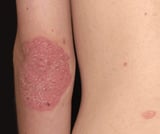If Vitamin D Is High
Taking very high doses of vitamin D supplements can cause vitamin D toxicity.
-
Vitamin D toxicity causes high levels of calcium in the blood.
-
People with vitamin D toxicity may lose their appetite, feel nauseated, vomit, and feel weak and nervous.
-
Doctors diagnose the toxicity by measuring levels of calcium and vitamin D in the blood.
-
Treatment involves stopping vitamin D supplements and giving the person fluids and sometimes drugs.
-
More bone is broken down than is reformed. (Normally, bones are continuously broken down and reformed—in a process called remodeling—to adjust to the changing demands placed on them.) As a result, calcium is released from the bone into the bloodstream.
-
More calcium is absorbed from food in the intestine.
Vitamin D may be used to treat psoriasis Psoriasis Psoriasis is a chronic, recurring disease that causes one or more raised, red patches that have silvery scales and a distinct border between the patch and normal skin. A problem with the immune... read more  , hypoparathyroidism, and renal osteodystrophy Chronic Kidney Disease Chronic kidney disease is a slowly progressive (months to years) decline in the kidneys' ability to filter metabolic waste products from the blood. Major causes are diabetes and high blood pressure... read more . Vitamin D has not been proven to prevent leukemia and breast, prostate, colon, or other cancers. Vitamin D supplementation does not effectively treat or prevent depression or cardiovascular disease, nor does it prevent fractures or falls. Some evidence, however, suggests that taking the combined recommended daily allowance of both vitamin D and calcium reduces the risk of hip fractures in those at higher risk.
, hypoparathyroidism, and renal osteodystrophy Chronic Kidney Disease Chronic kidney disease is a slowly progressive (months to years) decline in the kidneys' ability to filter metabolic waste products from the blood. Major causes are diabetes and high blood pressure... read more . Vitamin D has not been proven to prevent leukemia and breast, prostate, colon, or other cancers. Vitamin D supplementation does not effectively treat or prevent depression or cardiovascular disease, nor does it prevent fractures or falls. Some evidence, however, suggests that taking the combined recommended daily allowance of both vitamin D and calcium reduces the risk of hip fractures in those at higher risk.
Early symptoms of vitamin D toxicity are loss of appetite, nausea, and vomiting, followed by weakness, nervousness, and high blood pressure.
Because the calcium level is high, calcium may be deposited throughout the body, particularly in the kidneys, blood vessels, lungs, and heart. The kidneys may be permanently damaged and malfunction, resulting in kidney failure.
-
Blood tests
Vitamin D excess is usually diagnosed when blood tests detect a high calcium level in a person who takes high doses of vitamin D. Doctors also measure the level of vitamin D in the blood.
-
Stopping vitamin D supplements
-
Fluids given intravenously
-
Drugs
Treatment of vitamin D toxicity involves stopping vitamin D supplements to offset the effects of a high calcium level in the blood. Fluids are given intravenously as needed.
CLICK HERE FOR THE PROFESSONAL VERSION

© 2021 Merck Sharp & Dohme Corp., a subsidiary of Merck & Co., Inc., Kenilworth, NJ, USA
Was This Page Helpful?
Source: https://www.msdmanuals.com/home/disorders-of-nutrition/vitamins/vitamin-d-excess







Tidak ada komentar:
Posting Komentar